The nominations for Spiel des Jahres and Kennerspiel des Jahres 2016 will have given you some new games to keep[…]
Read more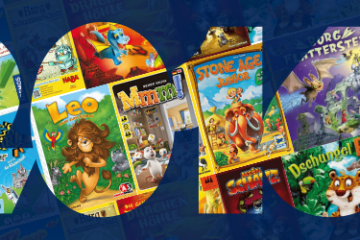

The nominations for Spiel des Jahres and Kennerspiel des Jahres 2016 will have given you some new games to keep[…]
Read more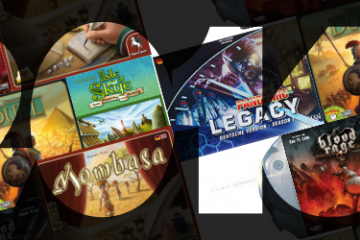
And we’re back with the Spiel des Jahres 2016 coverage. Today we’ll have a look at the Kennerspiel nominees and[…]
Read more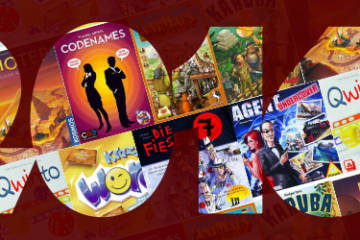
Can you smell it? It’s that time of the year again, the time when the Spiel des Jahres nominees are[…]
Read more
The year is god-knows-when BCE. The first people are spreading across the plains and forests looking for two things: food and shelter. Their most important tool in this dangerous voyage are Dominoes-like tiles they use to map out the surroundings. Okay, no, they didn’t really do that. You do that when playing Sapiens, map out the territory for your tribe to prosper.
Read more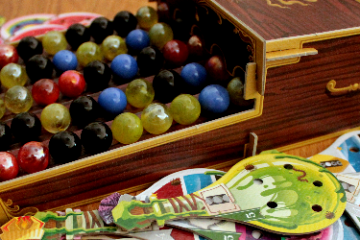
The Horribilorum Sorcery Academy for Witty Witches and Wizards, yet another institute of magical learning that not only ignores safety procedures, it’s probably using the handbook to start a fire. This time, students have to sit their Potions exam with ingredients from a rickety, old ingredient dispenser and a professor that actively encourages them to cause explosions in that thing and to drink their own potions they just created to see if they work. Realistically, this game is not about winning, it’s about surviving!
Read more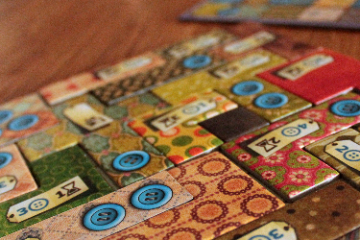
Uwe Rosenberg is well known for his deep, complex games like Agricola, Glass Road or Fields of Arle. But those are not all he does, he’s equally skilled at small and deceptively simple looking games. In this one, you don’t have to feed your starving farmers, you don’t work and pray in a monastery, you don’t even sell your vegetables at the gates of Loyang. All you have to do is simply make a patchwork blanket.
Read more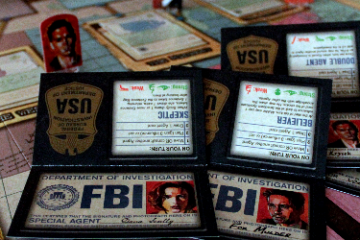
It’s safe to say that The X-Files was one of the most popular TV series created to date. (Or maybe still is, with the 2016 revival mini series ending on a huge cliffhanger.) So finding a new The X-Files boardgame published 13 years after the last episode of the original series was aired wasn’t a big surprise. There are millions of people out there with nostalgia for agents Mulder and Scully digging up alien conspiracies, and nostalgia sells. If you know me, then you know that’s why I’m skeptical towards licensed games in general. Nostalgia sells irrespective of quality. But there are good games made on a license, so lets see what side of that spectrum Kevin Wilson’s The X-Files falls on.
Read more
Contrary to most places you go to eat now, modern sushi was originally a type of fast food if Wikipedia is to be believed. It’s thus very fitting that Sushi Go! is a fast food type of game: you play it quickly, with no preparation needed, and then you go back for a second helping. Unlike fast food, however, you don’t have to feel guilty after Sushi Go!, it makes you neither fat nor sick, only entertained.
Read more
Anyone who grew up with a sibling will know the situation: there is ice cream, or cake, or something to be had, one of you had to split it and the other one would get first pick. As it turns out, that system not only works for ice cream but for exploring space ships as well, because that’s how you get your actions in Andromeda.
Read more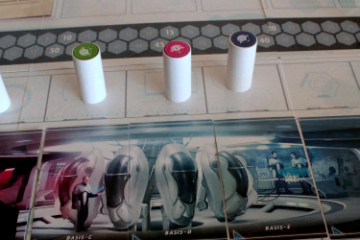
Consumable games, games that you play a number of times and then they are over for you, are a new thing. Pioneered by Risk Legacy, the idea has spread. More games are coming with the Legacy system, but that’s not the only way to make a game “expire”. T.I.M.E. Stories tries a different approach, one that leaves the game material unchanged and changes what you know instead.
Read more